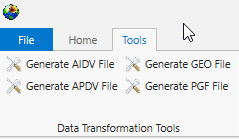Creating GEO Files - Stratigraphic Horizons from Vertical Borings
Begin by selecting the Tools tab, and select Generate GEO File.

Let's browse to the folder shown and select the file fuel-storage-gw.xlsx since we mentioned that this file had three surface which we can use for stratigraphic geology. In this case the three surfaces define just two layer which correspond to the vadose and saturated regions, however, that is an important minimal geology file for working with groundwater data.

If we select the only table, choose the correct settings and scroll to the far right we can see the fields that represent our bottom two surfaces:

Based on the values for both surfaces, it is clear they are Elevations and not Depths. For the Surfaces selectors, we don't choose Ground because it is already selected as the Top Surface. This file will have three surfaces defining two layers.
With all of our settings correct as shown above, all we need to do is click the Generate AIDV File button, and let's call the file btx.geo.

Since geo files are rather boring in post_samples, let's do something a bit more interesting with this data.
Below is our application and its output. We cheated a bit and I want to explain where and why.

We've kriged groundwater data into both layers of our model. However it doesn't make sense to ever display or do any volumetric analysis of groundwater data in the vadose zone. We could have used the subset horizons module to get only the single bottom layer corresponding to the saturated zone (aquifer) but if we did that, we wouldn't have both stratigraphic layers which we are displaying with the external_edges module and could display with a variety of other techniques. In that case we would need to create a parallel path in our application where we would use horizons to 3d to create either the top layer only or both layers in order to display the geology separate from the groundwater chemistry.
So we cheated and kriged into both layers, but we used the select cell sets module to turn off the upper layer before we display the plume with plume_shell. If we wanted to do volumetrics, we would be sure to only do so for the bottom layer. Other than a few seconds used to krige into the vadose layer we've managed to get by with a simpler application.